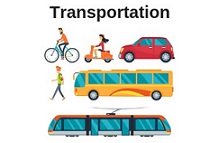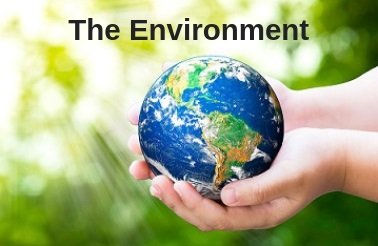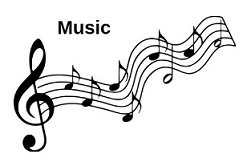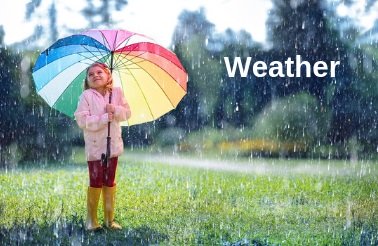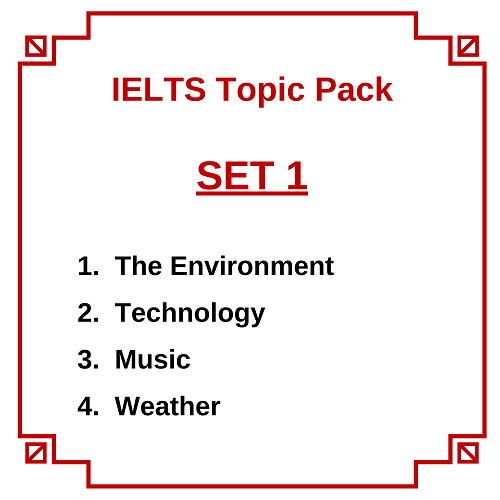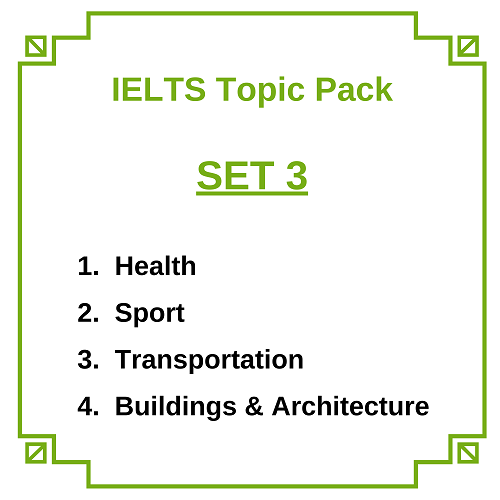Weather Vocabulary
You are almost guaranteed to need weather vocabulary at some point in your IELTS exam. Weather plays such an important part in our lives and is something every single one of us is affected by.
You will very likely use weather vocabulary when talking about yourself in Part 1 of the Speaking test and it may even be the topic of your Part 2 talk and follow-up questions in Part 3. Weather is a common subject for both Writing tasks and could also come up in either your Reading or your Listening tests.
You’ll also need weather vocabulary for answering questions about other common topics, especially the environment.
It’s a broad subject. Here are some common areas you could be asked about:
- What the weather is like in your country
- Your favourite weather or season
- How the weather affects how you or other people feel
- How the weather affects what you or other people do
- The effect of the weather on jobs or local transportation
- Bad, problematic or extreme weather
- Climate change
- Weather forecasting
To ensure that
you are well prepared to answer any weather-related question, I've included four
things on this page:
- IELTS-style questions on the topic of weather
- Sample answers
- A list of common weather vocabulary with definitions & sample sentences
- Links
to online reading and listening resources
You’ll find
PDF downloads of both the questions and sample answers and the weather vocabulary
list at the bottom of the respective sections.
The questions relate to the Speaking test because this part of the exam offers the broadest range of possible questions on the topic of weather. They give the best opportunity for me to demonstrate the vocabulary and for you to practise using it.
I’ve included IELTS-style questions and answers for all three parts of the Speaking test. I've highlighted key words and phrases in bold.
You'll find these words and phrases, and many others, in the vocabulary list beneath. The list also includes explanations and sample sentences and there’s an audio to listen to the pronunciation.
The weather vocabulary list contains words and phrases relevant to all parts of the IELTS exam.
Finally, at the bottom of the page I've added links to topical articles, short videos and podcasts that will help you to improve both your weather vocabulary and your reading and listening skills.
Here’s something to think about as you work through this page:
It’s important to learn new vocabulary in context so that you understand how it’s used by native speakers.
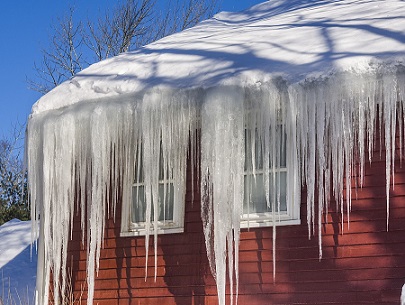 It gets icy when the temperature drops below freezing
It gets icy when the temperature drops below freezing
IELTS-Style
Speaking Test Questions and Answers
Common weather vocabulary is highlighted in bold.
Part 1
1) What is the weather like in your
country?
Our weather is very unpredictable. One minute it can be lovely sunshine, the next we’re experiencing a downpour. The UK is well-known for this.
2) Do you like the weather in your country?
Yes and no. I get frustrated that we have so many rainy days but we do have some glorious weather as well. When the sun comes out and there’s not a cloud in the sky, I couldn't be happier.
3) Is the weather the same in all parts of your country?
There are some quite marked regional differences. I live in the south-west where it's mild but we get high precipitation. It’s drier in the east and they actually had a drought this summer. Further north, it’s very cold in winter and they get heavy snow.
4) Are there any problems with the climate in your country?
We certainly seem to have experienced more violent storms and torrential rain in recent years. This has caused serious flooding in some places. A village near where I live had a flash flood this summer which washed away cars and a few buildings. People say global warming is to blame.
5) Does the weather ever affect the way you feel?
Most definitely. I feel so much more cheerful and full of energy when it’s sunny, whatever season it is. Even a break in the weather on an overcast day lifts my spirits.
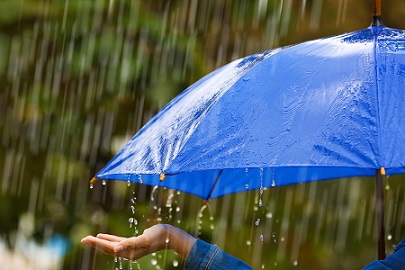 A heavy downpour.
A heavy downpour.Part 2
Describe your favourite season.
You should say:
- what the season is and when it occurs
- what the weather is like during this season
- what your typical activities are during this season
and explain why it is your favourite season.
That’s really difficult as I like things about every season but if I had to choose one, I guess I’d go for spring. It covers the months of March, April and May in my country and is actually the time of year I was born.
I spend the cold winter months looking forward to the first signs of spring as nature comes back to life with the change of the season – things like the snowdrops poking through the soil, colourful daffodils and crocuses, blossom on the trees, shiny new leaves and the birds singing their hearts out as they build their nests. It’s such a lovely time of year.
The weather gradually improves week by week, although we can still get frost right up to the end of April and even snow, but it’s usually just sleet and turns to slush as soon as it touches the ground. Hail storms are quite common and bright rainbows, which we see as a promise of fine weather to come.
Whilst there’s plenty of warm sunshine in spring, a shower of rain is never far away and the wind tends to be quite chilly so you need to dress up warm to go out. I keep a close eye on the weather forecast before making plans as to what to do.
To sum up the weather, you’d have to say that it’s changeable – a mixture of sunny spells and cloudbursts is how I’d describe it.
As the temperature rises, I definitely get more active. I start to take longer walks and go out on my bike more often. Weather permitting, we often have a barbecue on my birthday.
I also get stuck into some gardening. There’s always lots of cutting down and clearing up to do, plus the grass begins to grow again and needs cutting. At weekends, I go to the garden centre to buy bedding plants ready for a colourful summer display.
One of the best things of all about spring is the lighter evenings, such a relief after the dark winter months. You can now spend evenings outdoors if you want to rather than being stuck in watching TV.
So you see, there are lots of reasons why spring is my favourite month. I love the hotter weather of the summer, of course, but there’s something about the freshness of spring that makes it special.
 Daffodils & bright green leaves in spring.
Daffodils & bright green leaves in spring.Part 3
1) How do the different seasons affect the lifestyle of people in your country?
As we have a fairly mild climate, people are able to enjoy the outdoors all times of the year. Of course, summer is the most popular time for going to the beach and such like but even on blustery winter’s days, you’ll see people out walking along the shore enjoying the fresh air. With our unpredictable weather, we’re used to getting caught in the rain whatever the season so we just put on our waterproofs and off we go.
When it’s warm, people tend to take a picnic when they go out walking or cycling but in chilly weather, they’re more likely to stop off at a cosy pub or café for something to eat.
One of the biggest differences in our lifestyle through the seasons is down to the variation in daylight hours. In summer, it’s light until around 10.30pm whilst in the middle of winter it’s dark by 3.30pm. No-one feels much like going out when it’s cold and dark so we stay at home more.
2) Do you think people who live in cold places have different personalities to people who live in warm or hot places?
That’s something I’ve never considered but now I come to think of it, I’m sure they do. From my experience, people living in cold countries are fairly reserved and quite serious. Those living in hot climates, on the other hand, are more outgoing and full of life. That’s apart from the most humid regions where it’s so hot and sticky that you just want to sit around and do nothing all day.
Although I’d have to agree overall, I think there are many other factors than temperature and the weather that affect people’s personalities.
3) Do you think there are any problems with the world's climate now?
I believe that we’re facing many serious issues with our climate at the moment and they're only going to get worse unless we do something about global warming soon.
In my country, the winters are getting milder and wetter and serious flooding is becoming common. It’s a real problem in many areas. However, that’s nothing compared to the devastating tropical storms that some parts of the world are experiencing, more violent ever before. Meteorologists predict that they will get even stronger in the future which is a great concern.
One of the most serious problems of climate change is the melting of the icecaps as it’s causing rising sea levels. It’s possible that many coastal areas could be under water by the end of the century. Now that really is a worry.
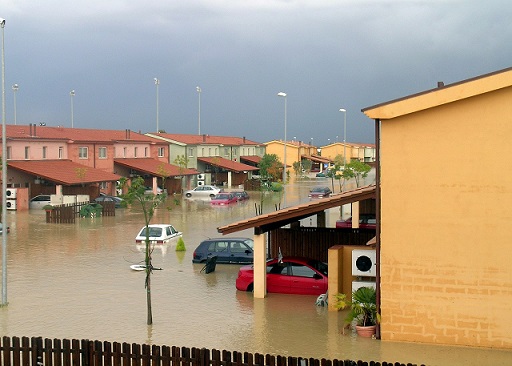 Serious flooding.
Serious flooding.Click this link to get a PDF download of these practise questions & sample answers.
Weather Vocabulary
* Important
- Do not try and learn this list of weather vocabulary.
- Identify the vocabulary you find useful for answering practise questions about the weather.
- Record these in your vocabulary notebook and practise using them regularly.
I recommend that you create
your own answers to the Speaking questions on this page. You will find many
other IELTS-style practise questions by searching online.
For help on how to learn
vocabulary, what to learn and how to record it, visit these pages:
How to Learn Vocabulary for IELTS
Top 6 Types of IELTS Vocabulary & Topic Word Lists
Weather Vocabulary – Common Words & Phrases
Weather Vocabulary Set 1: Key definitions
weather – the temperature or conditions outside with regard to heat, cloudiness, dryness, sunshine, wind, rain, etc.
- The weather can change very quickly up on the moor, so make sure you take your waterproofs when you go walking.
climate – the general weather conditions usually found in a particular area.
- The climate in the Andean mountains of Peru is very different to that found on the coast.
climate change – a change in global or regional temperature patterns.
- Scientists believe that climate change will lead to more extreme weather in the future.
global warming – a gradual increase in world temperatures caused by polluting gases, such as carbon dioxide, which are collecting in the air around the Earth and preventing heat from escaping into space.
- It’s not too late to reverse the effects of global warming but we must act right now.
Weather Vocabulary Pronunciation
Weather Vocabulary Set 2: Seasons
season – time of year characterized by certain weather.
- In Europe, we have four seasons but in some parts of the world, they have only two, such as the Philippines which has a wet season and a dry season.
winter – the coldest season of the year, December to February north of the equator and from and June to August in the southern hemisphere.
- I don’t like the winter as it’s very cold and there isn’t much daylight.
spring – the season between winter and summer when the weather becomes warmer and vegetation starts to grow again.
- In spring I love to watch nature come to life again; to see leaves sprouting on the trees and lambs in the fields.
summer – the warmest season of the year, June to August north of the equator and from and December to February in the southern hemisphere.
- We can’t wait for summer and are already planning the outdoor activities we’re going to enjoy in the nice weather.
autumn – the season between summer and winter when the leaves change colour and fall from the trees and it becomes cooler.
- Autumn is a great time for hiking as the weather is often pleasant and the trees look stunning as their leaves change to red, yellow and orange.
fall – Term for autumn in American English.
- In the US, fall is the time for celebrating Halloween and Thanksgiving.
Weather Vocabulary Pronunciation
Weather Vocabulary Set 3: Snowy weather
snow – water vapour frozen into ice crystals and falling to the ground as white flakes.
- I live in a hot climate so we don’t get snow but I’ve seen it in photos and it looks so beautiful.
snowflake – a single particle of snow.
- Did you know that every single snowflake is different which is quite amazing?
snowing – when snow is falling to the ground.
- It was so exciting to wake up this morning to find that it was snowing.
snowy – when it’s snowing or things are covered with snow.
- Children love snowy weather as it often means that the schools are closed.
fresh snow – snow that has recently fallen.
- The fresh snow glistened in the moonlight, the pristine carpet of white not marked by a single footprint.
heavy snow – when a lot of snow falls.
- The weather forecast predicted heavy snow so we got out our sledge ready to have some fun.
a blanket of snow – a complete covering of snow.
- It snowed heavily all afternoon and the countryside was soon covered in a blanket of snow.
snowstorm – when a large amount of snow falls, often mixed with wind.
- I was still at work when the snowstorm hit and had to sleep in my office as the buses were cancelled and I couldn’t get home.
blizzard – a storm with very heavy snow and strong winds.
- It’s dangerous driving on the roads in a blizzard.
whiteout – snowfall that is so heavy that it’s almost impossible to see anything.
- I was so glad I decided not to drive to the shops as the light snowfall soon turned into whiteout conditions.
flurry – very light snowfall.
- The children were hoping for heavy snow so they could make a snowman but all we got were light flurries.
avalanche – a large mass of snow and ice sliding rapidly down a mountainside.
- It was reported that five skiers were caught in the avalanche and rescuers are trying to dig them out.
snowdrift – a bank of deep snow formed by the wind.
- The road was blocked by snowdrifts blown by the strong winds.
sleet – a mixture of rain and snow.
- The sleet made the pavements slippery and it was difficult not to fall over.
slush – partly melted snow
- As the temperature rose slightly, the glistening white snow turned to mucky slush.
Weather Vocabulary Pronunciation
Weather Vocabulary Set 4: Cold weather
below freezing – below zero degrees Celsius or 32 degrees Fahrenheit.
- I put on a thick coat, gloves, hat and a scarf before going outside as it was well below freezing.
ice – very cold water in a solid state; you only see it when the temperature is below freezing.
- I had to clear ice from my car windscreen before I could drive to meet my friend.
icy – covered in ice; slippery because of ice.
- It’s better for elderly people to stay indoors when it’s icy as they can easily fall over and break a bone.
frozen – when the temperature is so cold that water has turned to ice or expression to mean feeling very cold.
- It was so cold that the surface of the pond was frozen.
- Ingrid got absolutely frozen watching her son’s team playing football.
freezing cold – very cold.
- Bruno was reluctant to take the dog for a walk as it was freezing cold outside.
bitterly cold – extremely cold.
- The sun was shining but there was a bitterly cold wind blowing.
hail – pieces of ice falling from the sky; frozen rain.
- I hate being out in hail because it really hurt when it strikes your face.
frost – ice crystals on a frozen surface.
- I could tell from the frost on the ground that the temperature overnight had fallen below freezing.
hard frost – when it gets very cold overnight and everything is covered with thick frost.
- The hard frost turned everything white and made the garden look like a magical frozen wonderland.
Jack Frost – mythical character who comes out at night and lays out frost.
- We woke in the morning to see that Jack Frost had been in the night.
frostbite – injury to any part of the body caused by overexposure to extreme cold.
- Frostbite is one of the greatest dangers faced by Arctic explorers.
to dress up warm – to wear warm clothes to protect yourself against wintry conditions.
- If you go out to play in the snow, be sure to dress up warm.
to melt – the process by which snow or ice changes to water as the temperature rises above freezing.
- After a week of freezing conditions, the temperature rose and the snow finally began to melt.
a cold spell / cold snap – a short period of cold weather.
- The weather is usually mild at this time of year but the forecasters say we’re in for a cold spell next week.
- The sudden cold snap had us searching for our hats, gloves and scarves.
chilly – uncomfortably cold.
- Fuyuko was feeling a bit chilly so she turned the heating up.
Weather Vocabulary Pronunciation
Weather Vocabulary Set 5: Rainy weather
precipitation – water that falls to the earth in the form of rain, hail, mist, sleet, or snow.
- The average annual precipitation in London is 23 inches (58 cm) which makes it drier than New York which has an average of 50 inches (127cm) of rain per year.
heavy rain – intense rainfall.
- The heavy rain kept the children indoors all day despite it being the weekend.
torrential rain – very heavy rain.
- The torrential rain was making driving conditions hazardous.
driving rain – heavy rain mixed with strong wind.
- We walked on through the driving rain, wanting to get home as quickly as possible.
to pour – to rain heavily.
- It was pouring with rain when I set off for the bus stop.
downpour – heavy shower of rain.
- Christian got caught in a downpour on his way to the party but fortunately had an umbrella with him.
cloudburst – sudden rainfall that it over quickly.
- The sudden cloudburst took them by surprise and they had to run for shelter.
raining cats and dogs – raining heavily.
- What miserable weather. It’s been raining cats and dogs all day.
to get drenched / soaked – to get very wet.
- Ekrem left her coat at home and got drenched in the cloudburst.
- The children had great fun playing in the rain but got soaked to the skin.
rainy day – a day when it rains a lot.
- I quite like a rainy day as I can be lazy and cuddle up by the fire with a good book.
a drop of rain – a small amount of rain.
- There was a drop of rain in the afternoon but it didn’t spoil our day out.
drizzle – very light rain.
- There was a bit of drizzle in the air as we set off on our walk but it didn’t come to anything.
gentle rain – light rain.
- The gentle rain was quite welcome at the end of a long, hot day as it really cooled the air.
shower (of rain) – a quick, light rainstorm.
- It was only a shower of rain so we didn’t get too wet.
- It was only a quick shower so we didn’t get too wet.
to get caught in the rain – to be outside when it rains unexpectedly.
- Meena was soaked through having got caught in the rain without a coat on.
to be rained off – to be cancelled or postponed because it’s raining or expected to rain.
- The pupils were looking forward to the school sports day but sadly it got rained off.
let up – to stop raining.
- We’ll go out for a walk if there’s a let up in the rain.
to clear up – when clouds or rain disappear.
- The forecast says that it will clear up by this afternoon.
puddle – a small pool of water usually formed by rainfall.
- When I was young, I loved splashing in puddles.
to flood – when a large amount of water flows over an area of land that is normally dry.
- There had been so much rain that the road was flooded.
a flash flood – a sudden and severe flood.
- The flash flood brought mud and debris gushing down the road bringing traffic to a standstill.
burst its banks – when a river overflows onto the land due to heavy rainfall and causes flooding.
- After nearly three days of continuous rain, the river burst its banks flooding the town.
rainbow – an arch of colours seen in the sky during or after rainfall when it is also sunny.
- As the storm passed, a beautiful rainbow appeared in the sky.
monsoon – the season of heavy rain in tropical climates.
- Nearly all of the country’s annual rainfall falls during the monsoon.
rainy season – another term for the time of the monsoon.
- The rainy season in my country is normally July to October.
horrid weather – unpleasant weather.
- I’m fed up of this horrid weather and can’t remember when I last saw any sunshine.
foul weather – bad weather.
- The foul weather kept the fishing boats in the harbour as it was too dangerous for them to go to sea.
Weather Vocabulary Pronunciation
Weather Vocabulary Set 6: Sunny weather
sunshine – direct sunlight unbroken by cloud.
- Isabella usually had lunch in the canteen but today she bought a sandwich and ate it in the sunshine.
sunny – bright with sunshine.
- Looking out at the pouring rain, Svetlana longed for a sunny day.
sunny spells – short periods of sunny weather.
- It was mostly cloudy for our trip to the zoo but there were some sunny spells in the afternoon.
heatwave – a period of very hot weather.
- Summer weather in the UK can be very unpredictable but this year we had a real heatwave.
to come out (the sun) – when the sun appears out of a cloudy sky.
- We were so pleased that the sun came out for our wedding photos as it had been a bit of a dull day up to then.
baking hot / boiling hot – very hot.
- Sunday was baking hot so Duong and his friends headed to the river for a swim.
scorcher – a very hot day.
- The day was a real scorcher, far too hot to be out in the sun for very long.
drought – a long period with no rainfall.
arid – having had little or no rain for a long time; too dry to support vegetation.
- Large areas of Australia are suffering from drought. The land has become arid and cattle and sheep on the ranches are dying from a lack of food and water.
humid / humidity – hot and damp conditions
- Celeste found the climate in Florida too humid and moved to California where it was still hot but with less humidity.
stifling – uncomfortable hot; can make you feel breathless.
- The heat of the day was stifling so the expedition travelled only at night when it was cooler.
sweltering – extremely hot.
- My classroom is sweltering in the summer so I take the children outside and we have lessons in the shade of a large tree.
close – warm and uncomfortable.
- We don’t have a humid climate in the UK but in summer it is often close which leaves you feeling sweaty and lethargic.
warm – a temperature in between hot and cold.
- Feeling the warm spring sunshine on your face is such a treat after the long, cold months of winter.
sunburn – painful red skin caused by being in the sun too long.
exposed to sunlight – allowing strong sunshine to fall on the skin.
- It’s important to limit our exposure to sunlight as sunburn can lead to skin cancer.
suntan / tanned – brown skin caused by long periods of exposure to sunlight.
- Jay got a great suntan on his sailing holiday in Greece and arrived home looking tanned and healthy.
sunscreen / suntan lotion – a cream or lotion that protects the skin from the damaging UV (ultraviolet) rays of the sun.
- As children, we were never allowed out to play in the sun without sunscreen on.
glorious weather – wonderful weather.
- We had glorious weather on our holiday in France.
fine weather – lots of sunshine and no rain.
- The fine weather we’re having at the moments has lifted everyone’s spirits.
pleasant weather – warm temperatures and mainly clear skies.
- Jerry made the most of the pleasant weather to get some gardening done.
a break in the weather – when the rain stops for a while.
- I waited for a break in the weather before taking the dog for a walk.
a spell of fine weather – a short period of good weather.
- It’s been a pretty awful summer but we’re finally enjoying a spell of fine weather.
clear blue skies – a sky without clouds.
- The clear blue skies drew hordes of tourists to the beach.
not a cloud in the sky – when no clouds are visible.
- There wasn’t a cloud in the sky and it promised to be a glorious day.
Weather Vocabulary Pronunciation
Weather Vocabulary Set 7: Cloudy weather
cloud – a grey or white mass, made up of very small drops of water, floating in the sky.
- As the dark clouds drifted overhead, Yana rushed to the garden to bring in her dry washing before it rained.
cloudy – when there are lots of clouds in the sky.
- Although it was a cloudy day, they still had a good time on the beach.
overcast – very cloudy with no sun is visible.
- Thahn was disappointed that it was overcast for the barbecue but at least it wasn’t raining.
partly cloudy – when it is sunny and cloudy at the same time.
- The TV weather forecast has said partly cloudy but it ended up being overcast for most of the day.
dull – not clear, bright or sunny.
- Dull days can be rather depressing, especially at this time of year when it’s cold outside and daylight hours are short.
Weather Vocabulary Pronunciation
Weather Vocabulary Set 8: Windy weather
wind – a natural current of air.
- There wasn’t enough wind to go sailing so they kayaked instead.
windy – when there is a lot of wind.
- It was a windy day and Dan spend the afternoon flying his kite.
breeze – light wind
- The flag was hoisted to the top of the mast where it flapped gently in the breeze.
high wind – strong wind.
- The forecast warned of high winds and a risk of fallen trees.
gale – a very strong wind.
- The gale blew all night and caused damage to several buildings.
gust – a sudden, strong blast of wind.
- It was a fierce storm with gusts of up to 80 miles an hour.
blustery – blowing in strong gusts.
- Kali’s umbrella turned inside out in the blustery weather.
wind chill (factor) – when the wind makes the air feel colder than the actual temperature.
- It was just above freezing but the wind chill factor made it feel more like minus 5.
picking up – becoming stronger
- The wind started picking up at about 3.00 pm and an hour later had reached gale force.
Weather Vocabulary Pronunciation
Weather Vocabulary Set 9: Foggy weather
fog – a thick cloud of tiny water droplets close to the ground or sea that makes it difficult to see.
- I hate driving in fog as it’s hard to see other cars on the road.
foggy – when there is a lot of fog.
- It’s so foggy today that I can hardly see the houses across the street.
smog – fog-like cloud caused by pollution.
- The smog hung over the city and many people wore masks when they went out to stop them breathing in the polluted air.
Weather Vocabulary Pronunciation
Weather Vocabulary Set 10: Stormy weather
storm – severe rainy and windy weather.
- The storm brought a tree down in our garden which only just missed our house.
thunder – a loud rumbling or crashing noise heard in the sky, especially during a storm.
- We heard the thunder in the distance and knew that a storm was on its way.
lightning – electric flash of light in the sky.
- The lightning lit up the whole sky and was quite spectacular.
thunderstorm – a storm that includes thunder and lightning.
- My pets hate thunderstorms. The dog barks at the thunder and the cat hides under the bed.
tropical storm – a storm with very high winds typical of tropical regions.
- The first time I was in a tropical storm I was very frightened as I’d never experienced such high winds before.
Hurricane / cyclone / typhoon – a tropical storm with extremely strong, damaging wind. The difference between them is where the storm originates in the world. Hurricanes come in from the Atlantic Ocean, cyclones from the Indian Ocean and typhoons from the Pacific Ocean.
- In 2017, a hurricane devastated the Caribbean island of Anguilla.
Weather Vocabulary Pronunciation
Weather Vocabulary Set 11: General weather terms
changeable – weather that often changes.
- The weather is very changeable at the moment and it’s difficult to decide what to wear to go out.
unpredictable – likely to change suddenly and therefore not easy to predict.
- The weather in the Scottish islands is notoriously unpredictable so it’s best to carry a raincoat at all times.
weather permitting – if the weather allows it.
- We’ll be having a family picnic in the park at the weekend, weather permitting.
the weather holds – fine weather continues.
- I hope the weather holds as I have a few days off next week.
freak weather conditions – weather conditions, often extreme and destructive, that are not normal for that place.
- Freak weather conditions are becoming more common due to global warming and climate change.
Weather Vocabulary Pronunciation
Weather Vocabulary Set 12: Weather forecasting
weather forecast – a prediction of what the weather is likely to be, broadcast on TV/radio programmes and printed in newspapers.
- I’ve just seen the weather forecast and we’re in for a nice day.
long-range forecast – the weather forecast for several days or weeks ahead.
- The long-range forecast is a bit disappointing as it predicts rain by the weekend.
mild – gentle, not harsh or extreme.
- We’re having really mild weather for the time of year.
- mild climate – a climate without extreme weather conditions.
- We have a mild climate in the UK with no extremes of heat or cold and few violent storms.
- mild winter – a winter that isn't particularly cold.
- It’s been a mild winter with only one real cold snap.
temperature – how hot or cold it is
- It’s cold in the shade but the temperature rises significantly when you step into the sun.
thermometer – instrument for measuring temperature.
- The thermometer on the wall showed that it was almost 100 degreesº.
degrees – measurement for temperature. Denoted by the symbol º.
- Temperature can be measured in degrees Celcius or Fahrenheit.
Celsius – measurement of temperature where freezing point is 0º and boiling point is 100º.
Fahrenheit – measurement of temperature where freezing point is 32º degrees and boiling point is 212º.
meteorology – the scientific study of weather.
- Nandor had always been fascinated by what caused different weather conditions and wanted to be study meteorology at university.
meteorologist – a person who studies weather patterns.
- Meteorologists are far better at predicting the weather than they were a decade ago.
Weather Vocabulary Pronunciation
Click this link to get a PDF download of this list of weather vocabulary.
Weather Idioms
There are a large number of weather idioms in the English language. Most of them use the weather as a metaphor for something else so there are very few that you’d use to answer questions about the weather itself.
For this reason, I haven’t included them on this weather vocabulary page but have given them a whole page of their own. You’ll find them here: Weather Idioms.
Ways to Improve Your Weather Vocabulary
One of the best ways to improve your vocabulary is through reading. Watching topic related YouTube videos and listening to podcasts is also hugely beneficial.
Here are some online resources I recommend.
Weather Forecasts & Weather Videos
Weather Articles
TED Talks
TED Talks are short videos with a powerful message and are generally very interesting. They’re ideal for improving your vocabulary and give valuable listening skills practise.
Search YouTube TED Talks Weather to help you improve your weather vocabulary.





